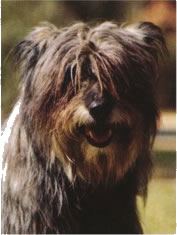
I received a email today asking when the Spanish word perro (dog) replaced can, a word for dog derived from the Latin canis, which appears in the name Canary Islands, (Islas Canarias in Spanish).
The Spanish word perro first appeared in the Diccionario de la Real Academia Española in 1737 [source]; was originally pejorative [source] and is possibly of onomatopoeic origin from the growling sounds made by dogs, perr perr (sounds more like a cat’s purr to me). Shepherds also used that sound to call their dogs. Another possibility is that perro comes from a pre-Roman language [source].
In Spanish the word can was used for dog until about the 14th century, after which it was gradually replaced by perro. The words for dog in most other Romance languages come from the Latin word canis: cane (Italian), chien (French), câine (Romanian), cão (Portuguese), can (Galician). One exception is Catalan, in which the word for dog is gos. [source].
The root of the Latin word canis, which appears in biological name for the subspecies of dogs: canis lupus familiaris, comes from the Proto-Indo-European base *kwon- (dog). This is also the root of the English hound (via the Proto-Germanic *khundas and the Old English hund), the English canine, the Greek κυων (kuōn), the German hund, the Irish cu and the Welsh ci [source].
The English word dog comes from the Old English docga, a word of unknown origin which was probably the name of a particular breed of dog, and had largely replaced the word hound as the general term for dog by the 16th century [source]. Hound started to be used to mean “a dog used for hunting” from the 12th century [source].
The name Islas Canarias probably comes from the Latin Insula Canaria (Island of the Dogs), which was originally just the name of Gran Canaria. It is possible that the dogs referred to were seals [source].
Occitan, like Catalan, also has gos /gus/, mostly in the southwest, beside the more common can /ko/ and its feminine canha /kanjo/, which coexists in the east with the French loanword chin. Apparently, according to etymonline.com, ‘cynic’ also derives from the common Indo-European root.
I like the explanation that it may come from the growling noise a dog makes, that makes a lot of sense.
In Brazilian Portuguese, ‘cachorro’ is very often used instead of ‘cão’.
‘Pero’ is also a Welsh pet name for a dog … life ‘Rover’ or ‘Buster’ in English – that is a name which you would give to your dog. There are other names are ‘Smwt’, ‘Gelert’ etc.
Gelert is the most well-known name because of the legend associated with it: http://en.wikipedia.org/wiki/Gelert
Most Welsh speakers would be uaware that ‘perro’ is the Spanish word for a dog.
What a completely sad story…
I was just going to ask where Brazil’s “cachorro” came from.
Traditional Welsh nursery rhyme “Dacw dadi’n mynd i’r ffair” refers to Pero the dog, and when I first heard this song (never knew it as a child) I was surprised to hear Pero, as I knew it was Spanish for dog, and haven’t been able to think why Welsh and Spanish should have this is common.
This got me wondering about “puppy”, which this says, if you follow it back through “puppet” and “pupil”, actually comes, via a convoluted path, from a word meaning “boy”.
Is it more common for words for dogs and puppies to come from different roots, or from the same one? To give an example of the latter, in Japanese, dog is 犬 inu and puppy is 子犬 ko inu, “young dog”. (子 is used as a prefix for the young of all sorts of species.)
“The name Islas Canarias probably comes from the Latin Insula Canaria (Island of the Dogs), which was originally just the name of Gran Canaria. It is possible that the dogs referred to were seals.”
The Korean word for ‘seal’ literally means ‘water dog’. Coincidence?